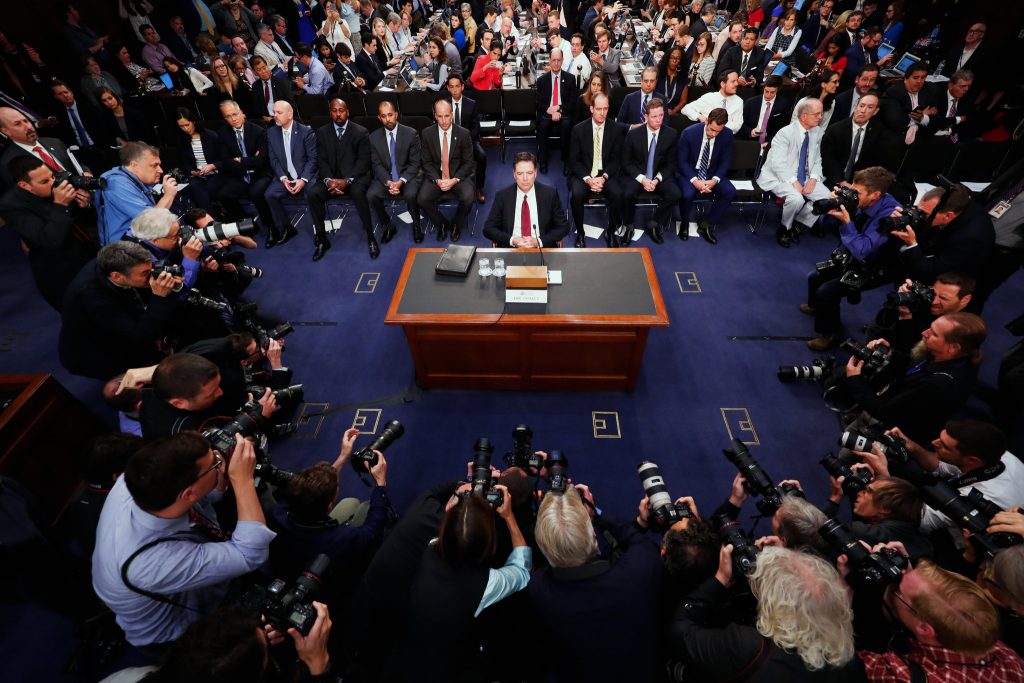In one of the most historic hearings at Congress, former F.B.I. Director James Comey who was fired by President Donald J. Trump in May said the president tried to derail the investigation into his former national security advisor, and chose to defame him and the F.B.I.
He said at the congressional hearing that President Trump and other members of his administration lied when they said the agents lost confidence in Mr. Comey.
He said: Those were lies, plain and simple, and I’m sorry that the F.B.I. workforce had to hear them, and I’m so sorry that the American people were told them.”
Mr. Comey’s politically charged hearing offered an opportunity to penetrate into details of his meetings and interactions with the president, which fell out of tradition and norms that usually kept a distance between the country’s leading law enforcement agency and the White House.
In disregard of those lines and protocols, Mr. Trump contacted the F.B.I. director several times. In an apparent breach of norms, Mr. Trump even asked him to declare personal loyalty to the president, drop the investigation into former National Security Council Advisor Michael Flynn. Many legal experts and Democrats portrayed Mr. Trump’s intervention and subsequent sacking of Mr. Comey as “obstruction of justice,” political meddling in an ongoing investigation that may lead to the impeachment of the young president.
And firing Mr. Comey last month generated a political maelstrom, added a new layer of drama to the unfolding saga of Russian meddling in the U.S. elections in 2016, and investigation into ties between the Trump campaign officials and Russia.
With regard to Russian efforts to influence the 2016 election, Mr. Comey punctured any doubts questioning whether it really happened. “They did it with purpose, they did it with sophistication.”
“There is no fuzz on that.” To Mr. Comey, Russia will continue what it had done before. ” They’ll be back.”
Trump’s ill-timed removal of Mr. Comey from F.B.I. Directorship eventually paved the way for the appointment of a special counsel to investigate the links between Trump’s associates and Russian officials, in a concession to Democrats’ demands for an independent inquiry.
Appointment of a special counsel was also the goal of the fired F.B.I. director. He orchestrated a leak through an intermediary turned out to be a law professor at Columbia University. His friend leaked his memos featuring his interaction with the president to media with the intended goal of opening the way for the special counsel.
On Thursday, Mr. Comey appeared calm and confident, offered his version of the story played out during his encounters with President Trump.
Regarding his first meeting with the president in January when Mr. Trump pressed for declaring his loyalty to the president, Mr. Comey called on Mr. Trump to release tapes if he has after he suggested that he may have recorded the conversations.
“The president surely knows if he taped me. And if he did, my feelings aren’t hurt. Release all tapes.”
When first news about the loyalty issue broke in media last month, the White House denied Mr. Comey’s version of the conversation during the dinner at White House in January, while Mr. Trump implied that there might be tapes that recorded their talk, and that would belie what the F.B.I. director said.
Mr. Comey said he forwarded all his memos about his conversations with the president to Special Counsel Robert S. Mueller III, a former federal prosecutor, and F.B.I. director served from 2001 to 2013.
After praising the integrity and professionalism of Mr. Mueller III, Mr. Comey noted that he would look into his memos about his interactions with the president to examine the possibility of obstruction. His words are read by media as a suggestion for investigating the president, a new development that could place Mr. Trump at the center of the inquiry.
“That’s a conclusion I’m sure the special counsel will work towards, to try and understand the intention was there and whether that’s an offense,” he said.
During his testimony where he appeared convincing and astute, Mr. Comey first time admitted that President Trump’s conduct falls within the scope of F.B.I. investigation but shied away from saying that he was personally under an investigation.
In another revelation, Mr. Comey made a strong case that the president’s conduct could be seen as obstruction of justice without directly saying it.
His hearing already secured a place in the history of most critical congressional hearings given its implications for the current political drama surrounding President Trump.
********
This article was possible thanks to your donations. Please keep supporting us here.


